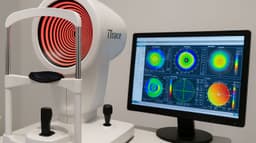
Which Form Of Corrective Eye Surgery Is The Safest?
Eye correction surgery, commonly referred to as vision correction surgery, is a transformative procedure designed to permanently enhance or correct visual impairments. Among the various methods available, Laser Vision Correction (LVC) stands out as a leading and widely recognised approach for individuals seeking a life free from dependency on glasses or contact lenses. This advanced surgical technique is regarded as one of the safest means to achieve lasting vision improvement, especially for patients dealing with myopia (nearsightedness), hyperopia (farsightedness), and astigmatism (blurring of vision due to an irregular shape of the eye).
Laser vision correction has revolutionised the field of ophthalmology, providing safe and effective solutions for individuals seeking normal vision and freedom from glasses or contact lenses. Among the various laser procedures available, LASIK (Laser In Situ Keratomileusis) stands out as one of the most widely performed and proven techniques. LASIK works by reshaping the cornea, the front part of the eye, to correct refractive errors such as nearsightedness, farsightedness, and astigmatism. The procedure involves creating a thin flap on the cornea, which is lifted to expose the underlying tissue. The excimer laser then precisely sculpts the corneal tissue to achieve the desired correction. LASIK is known for its rapid recovery, with many patients experiencing improved vision shortly after the procedure. It has garnered a reputation for safety and efficacy, making it a popular choice for those seeking a quick and efficient solution to their refractive issues.

Another notable laser vision correction procedure is SMILE (Small Incision Lenticule Extraction), which has gained prominence for its minimally invasive approach. It is carried out using a femtosecond laser for which the inventors were awarded the Nobel Prize for Physics. SMILE is considered less disruptive to the cornea compared to LASIK because it involves creating a small incision and extracting a lenticule, or a small piece of tissue, from within the cornea. This reshapes the cornea and corrects refractive errors. SMILE has demonstrated high precision in achieving vision correction and is associated with a potentially quicker recovery. Its unique method appeals to individuals seeking a less invasive alternative to traditional laser procedures. As with any surgical intervention, the safety and success of laser vision correction procedures depend on factors such as individual eye health, the expertise of the surgeon, and adherence to pre-and postoperative care guidelines.
Other LVC Procedures To Consider
The safety of corrective eye surgery depends on various factors, including the individual's eye health, the specific refractive error being corrected, and the expertise of the surgeon. Several other types of corrective eye surgeries have proven to be safe and effective. Here are some commonly performed and generally safe corrective eye surgeries:
PRK (Photorefractive Keratectomy)
PRK is another laser eye surgery that involves reshaping the cornea. It is suitable for individuals with thinner corneas or those not eligible for LASIK. The recovery time may be slightly longer compared to LASIK.
LASEK (Laser Epithelial Keratomileusis)
LASEK is a variation of PRK that involves preserving a thin layer of the corneal epithelium during surgery. It may be suitable for individuals with thinner corneas.
Implantable Collamer Lenses (ICL)
ICL is a procedure where a phakic intraocular lens is implanted to correct refractive errors. It is a reversible procedure and may be an option for those with higher refractive errors or thin corneas.

How To Pick The Right Procedure
Choosing the right vision correction procedure is a crucial decision that should be made based on thorough consideration of individual factors. Here are steps to help you pick the right procedure:
Comprehensive Eye Examination
Schedule a comprehensive eye examination with an experienced eye care professional. This evaluation will assess your overall eye health, determine the extent of your refractive error, and identify any other ocular conditions.

Discuss Your Lifestyle and Vision Goals
Clearly communicate your lifestyle, daily activities, and specific vision goals with your eye care professional. Different procedures may be more suitable depending on factors such as occupation, hobbies, and personal preferences.
Understand Your Refractive Error
Gain a thorough understanding of your refractive error, including myopia (nearsightedness), hyperopia (farsightedness), and astigmatism. Different procedures may be more effective for specific types of refractive errors.
Explore Available Procedures
Research and understand the various vision correction procedures available, including LASIK, PRK, SMILE, and others. Each procedure has its advantages, and your eye care professional can guide you in selecting the most appropriate one.

Consult with an Ophthalmic Surgeon
Schedule consultations with reputable ophthalmic surgeons who specialise in vision correction procedures. Discuss your candidacy for each procedure, potential risks, benefits, and expected outcomes.
Consider Eye Health and Anatomy
Factors such as corneal thickness, pupil size, and overall eye health play a role in determining the most suitable procedure. Your surgeon will assess these factors to recommend the procedure that aligns with your eye's anatomy.
Review Success Rates and Patient Satisfaction
Research success rates and patient satisfaction rates for each procedure. Reading testimonials and reviews from individuals who have undergone similar surgeries can provide valuable insights into the patient experience.
Evaluate Cost and Financial Options
Consider the cost of the procedure and inquire about financing options. While cost is a factor, it should not be the sole determinant; prioritise the procedure that best aligns with your visual needs and goals.
Ask Questions
Don't hesitate to ask your surgeon any questions or express concerns during the consultation. Understanding the procedure, its potential outcomes and the recovery process will help you make an informed decision.
Trust Your Surgeon's Expertise
Ultimately, trust the expertise and recommendations of your surgeon. An experienced surgeon will guide you toward the procedure that offers the best chance for optimal visual outcomes based on your individual circumstances.
Remember that the right procedure for one person may not be the best for another. By taking a thoughtful and informed approach, consulting with professionals, and considering your unique needs, you can make a well-informed decision about the vision correction procedure that aligns with your goals and lifestyle.

Enhance Your Decision For Laser Vision Correction
In addition to the comprehensive steps outlined, here are a few more considerations to enhance the decision-making process for choosing the right vision correction procedure:
Explore Advanced Technologies
Inquire about the use of advanced technologies and equipment during the procedures. Some clinics may offer the latest advancements in laser technology, contributing to precision and enhanced visual outcomes.
Understand Recovery and Downtime
Discuss the expected recovery period and downtime associated with each procedure. Consider how the recovery timeline aligns with your work schedule and daily commitments.
Factor in Age-Related Changes
If you are over 40 and experiencing presbyopia (difficulty focusing on close objects), discuss options that address both distance and near vision, such as multifocal or accommodating intraocular lenses.

Ask About Enhancement Options
Inquire about enhancement options in case additional adjustments are needed in the future. Understanding the potential for enhancements can provide a more realistic expectation of long-term visual stability.
Consider Long-Term Impact
Think about the long-term impact of each procedure. Some procedures may be more suitable for maintaining stable vision over time, while others may be associated with a higher risk of regression.
Verify Surgeon Credentials
Confirm the credentials and experience of the surgeon, ensuring they specialise in the specific vision correction procedure you are considering. Or the surgeon holds refractive surgery qualifications from the Royal College of Ophthalmologists or the European Society of Cataract and Refractive Surgeons.
Review Postoperative Care
Understand the postoperative care plan, including follow-up appointments and any necessary precautions. Adequate postoperative care is crucial for monitoring progress and addressing any concerns. Check who will be seeing you for your post-operative care.
Seek Second Opinions
If you have reservations or uncertainties, consider seeking second opinions from different ophthalmic surgeons. Additional perspectives can contribute to a more well-rounded decision-making process.
Check Clinic Accreditation
Ensure that the clinic where the procedure will be performed is accredited and adheres to safety standards. Accreditation ensures that the facility meets specific quality and safety criteria.
Evaluate Patient Education Resources
Assess the availability of patient education resources provided by the clinic. Well-informed patients are better equipped to make decisions aligned with their expectations and goals.
By incorporating these additional considerations into your decision-making process, you can approach the selection of a vision correction procedure with a more comprehensive understanding of the various factors at play. Always prioritise open communication with your eye care professionals and surgeons, as they play a crucial role in guiding you toward the most suitable solution for your vision needs.

Rediscover Clarity, Choose My-iClinic for Laser Vision Correction (LVC)!
Embark on a journey to visual freedom with My-iClinic's Laser Vision Correction (LVC) – where cutting-edge technology meets personalised care. Say goodbye to the hassle of glasses and contact lenses, and embrace a life of crystal-clear vision tailored just for you.
Why My-iClinic for LVC?
- On full registration of the General Medical Council
- Fellow of the royal college of Ophthalmologists or royal college of surgeons in the UK
- Fellow of the EBO Subspecialty Cataract & Refractive Surgery Diploma (FEBOS-CR diploma
- Certificate in Laser refractive surgery
- Postgraduate diploma in Laser refractive surgery
- Personalised treatment plans designed around your unique eye characteristics.
- Advanced technologies for precision and exceptional visual outcomes.
- A 5-star clinic attracting a national audience for our commitment to excellence.
- Personalised treatment plans designed around your unique eye characteristics.
- Advanced technologies for precision and exceptional visual outcomes.
- A 5-star clinic attracting a national audience for our commitment to excellence.
Your Vision, Our Priority!
Schedule your consultation today to explore the possibilities of Laser Vision Correction at My-iClinic. Experience the freedom of clear vision, backed by expert care and a dedication to your visual well-being. Trust us to reshape your world – Clearer. Brighter. Yours.
Find out more by Speaking to our team









